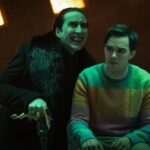Unquiet Americans: The King of Comedy, by Aaron Pinkston
Of all the films I’ve reviewed in the Unquiet Americans series, Martin Scorsese’s The King of Comedy might be the least like a traditional comedy. It can be funny, for sure, but the deep psychological dig into Rupert Pupkin’s obsession with his comic idol is genuinely disturbing. As a film about famous comedians and aspiring comedians, however, it is the first of the series that is about comedy, which is a fascinating and fruitful distinction to the more traditional and laugh-inducing previous films.
For those who haven’t seen it (I can’t blame you too much, as this was my first viewing), The King of Comedy follows Rupert Pupkin (Robert De Niro), a troubled man with an obsession over celebrity. He collects autographs from famous people while waiting in the crowds outside of the very popular Jerry Langford Show — which seems to be as significant as Letterman or Carson in their prime. At the opening of the film, Pupkin works his way into an impromptu meeting with Langford (Jerry Lewis), where he looks for advice on how to break it into the comedy scene with the ultimate hopes of being featured on the show. At this point, Pupkin seems a little overzealous, but basically harmless. After Langford tells Pupkin to get in touch with his office about an opportunity (unbeknownst to Pupkin, this is just a way to get rid of him), we begin to see the delusions and shaky morality that ultimately leads to a dangerous situation.
Langford provides a really interesting contrast to Lewis’s public persona and the work we see in The Ladies Man. Unlike Lewis at the time, Langford is at the height of his popularity, but the talk show host has the air of being beaten down by the business. He is mean-spirited, unappreciative of those around him. This, of course, is taken to the extreme with his relationship with Pupkin, who desperately desires some unearned recognition. It’s a slightly sad performance, played straight against the zany, obnoxious persona of Lewis’s most known work. Coming ten years after the debacle that was The Day the Clown Cried, which basically obliterated his career, this was a shockingly honest and stark comeback for the former giant. Though De Niro has the shinier role and more screen time, Lewis’s performance is key in making the film work. For the film’s dark humor to land, we have to want Pupkin to get to Langford even when we understand that the situation is all wrong.
Throughout the film, a number of fantasy illusions from Pupkin bring us into his twisted sense of reality. These sequences are expertly edited and shown in different ways to play tricks on the viewer. The first of the fantasies, which takes place immediately after Pupkin and Langford’s initial run-in, is difficult to immediately place. Though it is a huge jump from the previous scene, with Langford basically indebted to Pupkin, it starts so naturally and the performers play it so straight that it is only when the scene begins to intercut Pupkin performing their conversation that we see what is truly going on. There are many more fantasies that play throughout the film with a number of different tones and styles. Some of them play in an obviously fantastical space as wish fulfillments, but others are less easily detected. In one particular scene, Pupkin and his unrequited love travel to Langford’s summer home for a visit. At first one may think this is one of these fantasies, making the way the scene devolves even more thrilling and creepy. Scorsese uses this ambiguity perfectly, leading to the film’s final sequence, which I’ll touch on later.
Without getting into specifics, The King of Comedy leads to Rupert Pupkin’s big break, a spot on the Jerry Langford Show. His comedic monologue is quite interesting. First of all, it isn’t terrible. Yes, he’s not as polished as he could be with more experience and his jokes don’t land, but he has a definite point-of-view and stage presence. Despite (presumably) never before performing in front of an audience, he knows how to work the crowd — one of the most difficult traits of a working comedian to perfect, and Pupkin seems to be a bit of a natural. Even at the most mild jokes, the crowd responds favorably, as if they trust his introduction as the “new king of comedy” as a fact.
The material is telling of Pupkin’s personality. Its content is embellished (his mother being dead for nine years, for example, we know is untrue), but we are perhaps seeing the only time when Pupkin is a genuine human being. We can see into his true psychology, understand a bit of who he is and why he turned out in this way. This is a little offputting, given the jokes aren’t atypical for a real stand-up comedian, focusing on a turbulent upbringing with cruel and distant parents. I don’t think the film is trying to make a broad statement on the nature of stand-up comedians, but you can see it there.
After the performance and a subsequent arrest, Pupkin becomes a cultural celebrity. He lands a mega contract for a memoir and his own television show. Unless, of course, he’s making it all up. The film’s prologue could easily be read as one of the hidden fantasy sequences; in fact, it is more likely that it would be given how Pupkin ends up. But taking the ending at face value within the reality of the film, it is a startlingly accurate view of media and celebrity culture that would become much more volatile in the years following the film’s release. Today, people become wealthy and famous with little more than a willingness to do bad or disgusting things in front of an audience or camera. If The King of Comedy took place today, Pupkin would have a much easier access to be heard with YouTube, etc. but in a much more crowded arena. Maybe Pupkin wouldn’t have to go to his extreme lengths, or perhaps the freedom of a digital stage would provide more sinister possibilities. This is maybe an incorrect reading of the film, but certainly a more profound one.






























